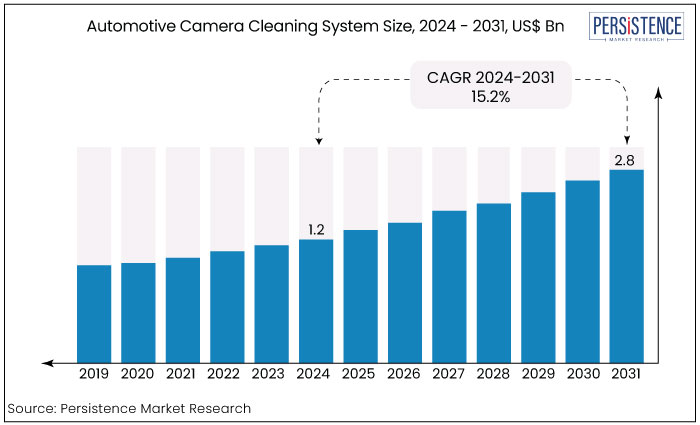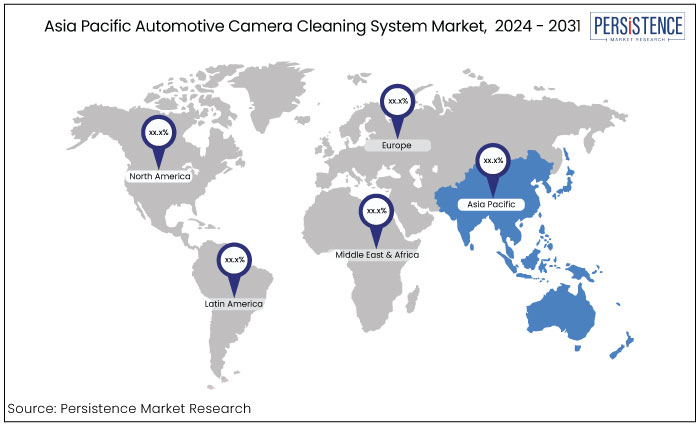Automotive Camera Cleaning System Market
Industry: Automotive & Transportation
Published Date: September-2024
Format: PPT*, PDF, EXCEL
Delivery Timelines: Contact Sales
Number of Pages: 171
Report ID: PMRREP34793
The global automotive camera cleaning system market is projected to increase from US$1.2 Bn in 2024 to US$2.8 Bn by the end of 2031. The market is expected to exhibit a CAGR of 15.2% during the forecast period from 2024 to 2031.

Key Highlights of the Market
|
Attributes |
Key Insights |
|
Automotive Camera Cleaning System Market Size (2024E) |
US$1.2 Bn |
|
Projected Market Value (2031F) |
US$2.8 Bn |
|
Global Market Growth Rate (CAGR 2024 to 2031) |
15.2% |
|
Historical Market Growth Rate (CAGR 2019 to 2023) |
11.5% |
Asia Pacific is witnessing a rapid surge in the automotive camera cleaning systems market. This growth is fueled by the rising sales of both passenger and commercial vehicles, coupled with heightened awareness regarding vehicle safety standards.
Key markets driving this demand include China, Japan, South Korea, and India, where robust economic activity and technological advancement are accelerating the adoption of camera cleaning system.
Asia Pacific expected to be emerging automotive camera cleaning system market. A few factors that are estimated to provide opportunity for the market players in the region are the growing awareness regarding safety technologies and increasing production as well as sales of vehicles. Leading contributors to market growth in this region are Japan, India and China.

Advanced driver assistance systems are becoming increasingly prevalent in passenger vehicles, driven by rising consumer demand for enhanced safety features. ADAS rely heavily on camera-based technologies for functions such as lane departure warning, adaptive cruise control, and automatic emergency braking.
Clear and unobstructed camera lenses are crucial for the accurate operation of these systems, necessitating effective camera cleaning solutions. Stringent regulatory mandates and safety standards worldwide are compelling automotive manufacturers to integrate advanced safety technologies into passenger vehicles.
Globally enforced regulatory mandates and stringent safety standards are increasingly compelling automotive manufacturers to integrate cutting-edge safety technologies into passenger vehicle.
The automotive camera cleaning system market is witnessing significant growth driven by the increasing adoption of advanced driver assistance systems (ADAS) and autonomous vehicles. These systems rely heavily on clear and unobstructed camera lenses for accurate operation, making camera cleaning systems crucial for vehicle safety and functionality.
With the proliferation of ADAS in vehicles, the demand for reliable automotive camera cleaning systems is expected to soar. These systems ensure that cameras maintain optimal visibility in various weather conditions, enhancing the effectiveness of safety features such as lane departure warning and adaptive cruise control.
The global increase in vehicle production, particularly in regions like Asia-Pacific and Europe, is contributing significantly to the expansion of the market. Original equipment manufacturers (OEMs) are integrating advanced camera systems into new vehicle models, thereby creating a parallel demand for reliable cleaning solutions.
The rise of electric vehicles presents new opportunities for the market. EV manufacturers are increasingly incorporating advanced ADAS features into their vehicles, necessitating efficient cleaning systems to maintain clear camera lenses.
Emerging markets in Latin America, the Middle East, and Africa are witnessing rapid urbanization and infrastructure development, driving the demand for vehicles equipped with advanced safety features. This is one of the key market trends expected to fuel the adoption of automotive camera cleaning systems in these regions.
The market for automotive camera cleaning systems began to gain traction primarily due to the increasing adoption of advanced driver assistance systems (ADAS) in vehicles worldwide. ADAS rely heavily on clear and unobstructed camera lenses to function effectively, thereby boosting the demand for efficient camera cleaning solutions.
Growth was particularly notable in emerging markets where rapid urbanization and infrastructure development spurred the demand for vehicles equipped with advanced safety technologies. Also, partnerships and collaborations between automotive manufacturers and technology providers aimed at enhancing the performance and reliability of camera cleaning systems further bolstered market dynamics. The market recorded a CAGR of 11.5% during the historical period.
Global vehicle production is projected to increase, particularly in emerging markets and segments like electric vehicles (EVs). This growth in vehicle manufacturing will generate parallel demand for automotive camera cleaning systems as OEMs seek to integrate advanced safety features into new models.
Rapid urbanization, infrastructure development, and increasing disposable incomes in emerging markets will contribute to the growth of the automotive camera cleaning system market. These regions present significant growth opportunities as demand for vehicles equipped with advanced safety technologies continues to rise. The market for automotive camera cleaning system is estimated to record a CAGR of 15.2% during the forecast period.
Evolution of Autonomous Driving Technologies
The evolution of autonomous driving technologies represents another pivotal driver for the automotive camera cleaning system market. Autonomous vehicles rely heavily on a suite of sensors and cameras to perceive their environment and make real-time decisions. These cameras must maintain pristine visibility to ensure accurate data capture and processing, which is critical for achieving higher levels of autonomy.
As AV technologies advance from driver assistance features to fully autonomous capabilities, the complexity and sophistication of camera systems increase exponentially. AVs require not only enhanced camera resolution and coverage but also seamless operation of cleaning systems to prevent any disruption in sensor performance.
This necessitates the development of cutting-edge camera cleaning solutions capable of meeting stringent reliability and performance standards demanded by AV manufacturers and regulatory bodies.
Advancements in vehicle electrification and the evolution of autonomous driving technologies are pivotal drivers propelling the automotive camera cleaning system market forward. Manufacturers and stakeholders in this market are poised to capitalize on these drivers by innovating and delivering advanced cleaning solutions.
Advancements in Vehicle Electrification
The shift toward vehicle electrification, driven by environmental regulations and consumer demand for cleaner and more efficient transportation, is profoundly impacting the automotive camera cleaning system market. As electric vehicles gain traction globally, the integration of advanced driver assistance systems and camera-based technologies becomes essential for enhancing safety and performance.
EVs present unique challenges for camera visibility due to their quieter operation and distinct design characteristics compared to internal combustion engine vehicles. Issues such as reduced engine noise, which traditionally masked external sounds, now emphasize the importance of clear camera lenses for detecting pedestrians, obstacles, and other vehicles accurately.
EVs often feature advanced autonomous capabilities and are equipped with multiple cameras for 360-degree visibility. These cameras must operate flawlessly in varying weather conditions to ensure the effectiveness of ADAS features like automatic emergency braking, adaptive cruise control, and lane-keeping assistance. As a result, there is a heightened demand for sophisticated camera cleaning systems capable of maintaining optimal visibility under diverse environmental circumstances, including rain, snow, and dirt.
Cost Associated with Integrating and Maintaining Systems in Vehicles
One of the primary restraints for the automotive camera cleaning system market is the cost associated with integrating and maintaining these systems in vehicles. Camera cleaning systems involve additional components such as pumps, reservoirs, cleaning mechanisms, and sensors, which add to the overall manufacturing and installation costs of vehicles.
Cost is a critical factor in decision-making, especially as they balance the incorporation of advanced safety technologies like ADAS with keeping vehicle prices competitive in the market for automakers. The cost-effectiveness of camera cleaning systems becomes crucial in determining their adoption rate across different vehicle segments, particularly in mass-market vehicles where affordability is a significant concern for consumers.
The complexity of camera cleaning systems can lead to higher maintenance and repair costs over the vehicle's lifespan. Consumers may be deterred from opting for vehicles equipped with these systems if they perceive the long-term maintenance costs to be prohibitive or if they lack awareness of the benefits these systems provide in terms of safety and reliability.
Limited Awareness and Education
Many consumers are unaware of the benefits that automotive camera cleaning systems provide. Clear camera lenses are essential for the reliable operation of ADAS features such as lane departure warning, adaptive cruise control, and collision avoidance systems. Without proper education, consumers may not fully appreciate how camera cleaning systems contribute to overall vehicle safety and performance.
There is a perception among some consumers that vehicles equipped with advanced safety features, including camera cleaning systems, come at a higher cost. Limited awareness about the potential long-term benefits and safety advantages of these systems may deter consumers from choosing vehicles with such features, especially if they perceive them as unnecessary expenses.
Consumers may also have concerns about the reliability and effectiveness of camera cleaning systems, particularly in challenging weather conditions or over extended periods of use. Without adequate education about the capabilities and maintenance requirements of these systems, potential buyers may hesitate to invest in vehicles equipped with them.
Expansion of Aftermarket Sales
The aftermarket segment presents another significant opportunity for industry participants in the automotive camera cleaning system market. As vehicle owners increasingly seek to upgrade and maintain their vehicles' safety and performance features, aftermarket sales of camera cleaning systems are poised for growth.
Many vehicles on the road today are equipped with basic or older-generation camera cleaning systems. The aftermarket offers opportunities to retrofit these vehicles with advanced cleaning technologies, such as high-efficiency pumps, precision cleaning nozzles, and eco-friendly cleaning fluids. Upgrading existing systems can enhance reliability and performance, aligning vehicles with current safety standards and consumer expectations.
Increasing consumer awareness about the benefits of camera cleaning systems through educational campaigns can stimulate aftermarket demand. Industry participants can educate vehicle owners about the importance of clear camera visibility for safety, regulatory compliance, and overall vehicle performance.
Competitive rivalry in the global automotive camera cleaning system market is likely to become more intense in the coming years, as technological evolution continues at a robust pace. Tech giants are collaborating with other companies, universities, and researchers to innovate.
Large manufacturers are directing their investments toward innovations in fluid types or nozzle types to enhance a system's existing functionality. Critically growing need to pioneer better technology will facilitate the strategic collaborations between industry players.
Competitive rivalry in the global market is likely to become more intense in the coming years, as technological evolution continues at a robust pace.
Tech giants are collaborating with other companies, universities, and researchers to innovate. Hence, large manufacturers are directing their investments toward innovations in fluid types or nozzle types to enhance a system's existing functionality. Critically growing need to pioneer better technology will facilitate the strategic collaborations between industry players.
Recent Industry Development
January 2024, Valeo joined forces with Teledyne FLIR, a division of Teledyne Technologies Incorporated, to pioneer thermal imaging technology in the automotive realm. This strategic alliance aims to bolster road safety by integrating advanced thermal imaging cameras into the next evolution of Advanced Driver-Assistance Systems (ADAS), ushering in a new era of vehicle safety and enhancing the well-being of all road users
March 2022, Calsonic Kansei Corporation embarked on a pioneering initiative: the development of a self-cleaning camera system. This innovative technology integrates cutting-edge features like hydrophobic coatings and ultrasonic cleaning mechanisms. By preventing dirt buildup, the system guarantees uninterrupted clarity for camera-based applications, enhancing overall reliability and performance.
|
Attributes |
Details |
|
Forecast Period |
2024 to 2031 |
|
Historical Data Available for |
2019 to 2023 |
|
Market Analysis |
US$ Billion for Value |
|
Key Regions Covered |
|
|
Key Market Segments Covered |
|
|
Key Companies Profiled |
|
|
Report Coverage |
|
|
Customization & Pricing |
Available upon request |
By Vehicle Type
By Nozzle
By Application
By Sales Channel
By Region
To know more about delivery timeline for this report Contact Sales

The shift toward vehicle electrification is a key driver for the market growth.
Expansion of aftermarket sales presents a key opportunity for the market players.
The global automotive camera cleaning system market is projected to increase from US$1.2 Bn in 2024 to US$2.8 Bn by the end of 2031.
A few of the leading industry players in the market are Ficosa Internacional SA, KAUTEX TEXTRON GMBH & CO. KG, and dlhBOWLES.
Passenger vehicle segment to account for the significant market share.